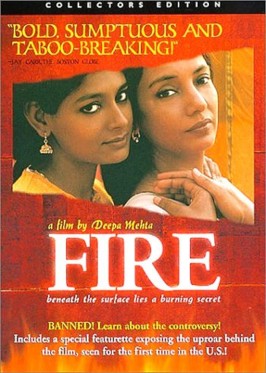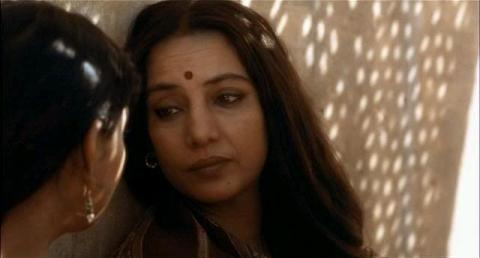Directed by: Deepa Mehta || Produced by: Bobby Bedi, Deepa Mehta
Written by: Deepa Mehta || Starring: Nandita Das, Shabana Azmi, Karishma Jhalani, Dilip Mehta, Javed Jaffrey
Music by: A.R. Rahman || Cinematography by: Giles Nuttgens || Editing by: Barry Farrell || Country: Canada, India || Language: English
Running Time: 108 minutes
The first installment of Deepa Mehta’s Elements (1996, 1998, 2005) trilogy, Fire is the “controversial and infamous” Canadian drama about a lesbian love-affair between two married women in India. Amusingly and predictably enough, the film drew multiple riots between free speech advocates and groups who apparently don’t like homosexuals very much. I wonder how much unrest there would have been if The Kids are Alright (2010) had been released in Indian theatres instead of Fire, because Kids also had lesbians in it, and that movie sucked! Fire, on the other hand, is a well-crafted drama executed with memorable cinematographic emotion. Despite a few questionable screenwriting decisions here and there, Mehta’s quasi-family drama is strong enough to make its colorful characters and conflicts stick with you long after viewing.
One aspect at which Fire excels is establishing and maintaining tone. Right from the start, Fire builds an atmosphere of tension that refuses to yield. This stems primarily from the interactions between the two central female characters and their in-laws, the heart of this drama. Awkwardness is not the right descriptive word here, as awkwardness implies either the script didn’t function correctly or that there is an element of humor in these scenes. Neither situation is the case.
What Fire does brilliantly is lay a vice grip on its audiences’ throats and increases the pressure as the movie’s story builds. The main elements of this tension and tone are solid acting from the cast, efficient pacing from the script, and a passionate, if somewhat melodramatic score from A. R. Rahman. All these elements combine organically through the absorbing climax. Writer-director Deepa Mehta understands how to stage her scenes for maximum drama without making them feel too incredible or over-the-top. The film’s ambient lighting is also stellar, giving the narrative an almost constant erotic feel reminiscent of the forbidden sexualities displayed by classical Hollywood noir.
Another critical element Mehta nails are her characterizations. All the characters in the principal extended family have admirable traits as well as notable flaws. Mehta’s script takes time to establish each character as a believable person with faults, quirks, and past histories that explain their actions throughout the plot. Although Fire’s subtext boasts several obvious political messages, it’s not hitting you over the head with their simplicity. Strange as it may sound, this movie reminded me of District 9 (2009) in that that was another film with a strong political message that didn’t come across as heavy-handed.
Crossing the fine line between an interesting story with a noteworthy theme like Fire or District 9, and a condescending, overly simplistic, manipulative cheese-fest like Avatar (2009) or Dances with Wolves (1990), ultimately depends on the strength of a story’s characters and how well they are written and performed. Films like the former two are far more effective at communicating their message than the latter two because we as an audience can connect with the people in the story and better understand their plights. Those characters feel like real people. If Fire had one-dimensional stereotypes like Avatar (2009), it could have been a preachy, boring, homoerotic disaster. Mehta, thankfully, knows how to write believable characters and cast them well.
The only part of the film I had a major problem with was the ending. The film’s emotional climax drops in its penultimate scene, and is a symbolic and effective dramatization of Fire’s main theme. Surprisingly, there is an epilogue following that climax that almost negates the entire meaning of the previous scene. This one brief epilogue does much to lessen the power of the picture’s symbolism, and for me, detracted from my overall viewing experience and evaluation of Fire. This tacked-on ending to the film is, for lack of a better word, a copout.
It is also worth noting that this film is much more akin to Western films than Hindi films. Although the story is set in India, Fire is primarily a Canadian production, and as such, has more stylistic elements in common with North American filmmaking. The dialogue is primarily in English and resembles the more subdued, less theatrical acting of Western films. Also, there are no musical numbers and the running time is less than two hours long. Just in case y’all were wondering…
Top to bottom, there isn’t much that Fire doesn’t get right. It remains an effective film that has much to say and has meaning behind every scene. There are some non-insignificant, questionable writing decisions every now and then, but these are forgivable against the greater thematic and cinematographic prowess of the film. Fire’s lone true stumble is at the one-yard line, where it tries to force a pseudo-happy ending out of what was otherwise a tragic tale. In the end, though, Fire succeeds on the depth of its characters and the emotional intensity of its social conflicts, both of which are lit, staged, and filmed in intimate detail.
—————————————————————————————————————————————————————————————-
SUMMARY & RECOMMENDATION: Fire nails its lustful, sensual mood and tense atmosphere. Mehta orchestrates great lighting and blocking to mine the most out of every facial expression and emotional confrontation, and her actors deliver memorable performances. A.R. Rahman’s score further adds to the sexual tension.
— However… the epilogue scene feels forced and contradictory to the overall plot.
—> Fire comes RECOMMENDED.
? I think I’m gonna start using the insult, “Pompous fool,” from now on. F O O L.



Discussion
Trackbacks/Pingbacks
Pingback: ‘The Edge of Heaven’ (2007): Review « Express Elevator to Hell - July 19, 2014
Pingback: ‘The Lunchbox’ (2013): Review | Express Elevator to Hell - January 30, 2015
Pingback: ‘Earth’ (1998): Review | Express Elevator to Hell - September 14, 2016
Pingback: ‘Selma’ (2014): Review | Express Elevator to Hell - January 13, 2018
Pingback: Mani Ratnam’s ‘Roja’ (1992) & ‘Bombay’ (1995) | Express Elevator to Hell - December 18, 2022